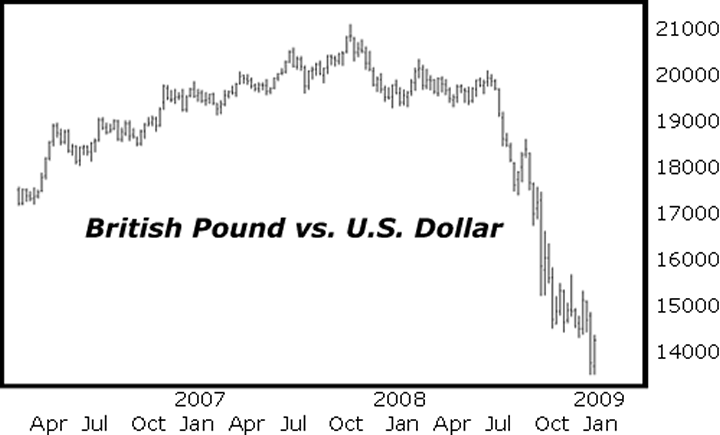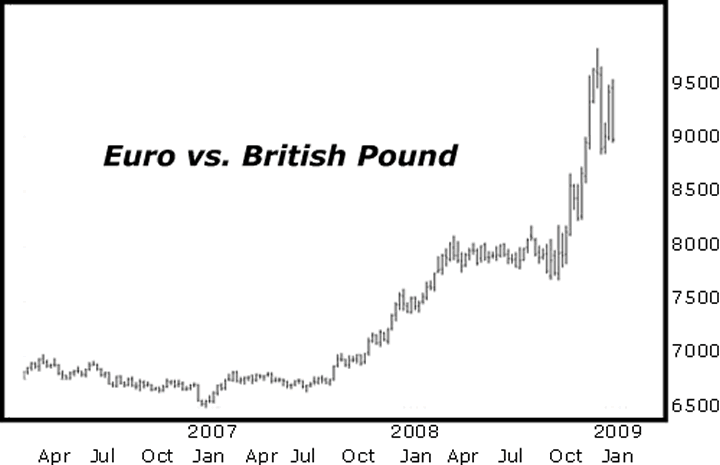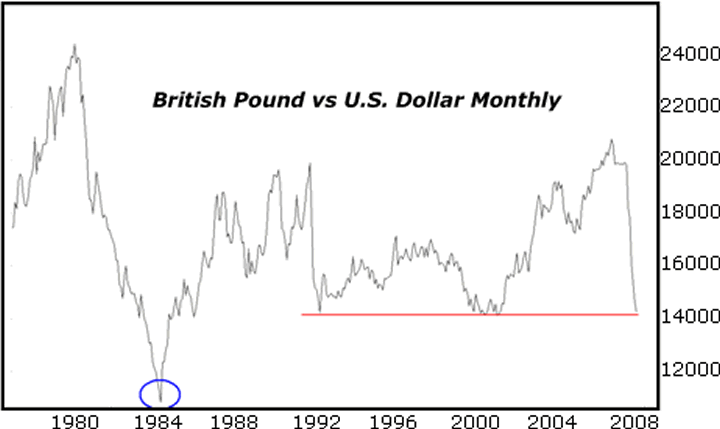British Pound Collapsing Under Weight of Bankrupt Banks Liabilities
Currencies / British Pound Jan 31, 2009 - 02:06 PM GMT

 Jack Crooks writes: Great Britain's Prime Minister, Gordon Brown, is meddling in the Bank of England and U.K. Treasury, much the same way that our Hank Paulson and Ben Bernanke have done. And now everything that Mr. Brown is struggling with underlines why his home currency has performed so poorly recently … and will continue to disappoint.
Jack Crooks writes: Great Britain's Prime Minister, Gordon Brown, is meddling in the Bank of England and U.K. Treasury, much the same way that our Hank Paulson and Ben Bernanke have done. And now everything that Mr. Brown is struggling with underlines why his home currency has performed so poorly recently … and will continue to disappoint.
I first warned readers of the pound's problems on December 22, 2007 , in my Money and Markets column. At that time I forecasted that the British pound would be the U.S. dollar of 2008. And that forecast did not disappoint.
Back then, the pound traded above $2, and now it's sitting at a measly $1.43, a whopping 27% decline!
And the damage isn't limited to just U.S. dollar gains …
The euro has risen to a record high against the pound as recently as December 30, 2008 … even while the euro had fallen to $1.40.


And in my opinion …
Things Aren't Going to Get Better For the Pound Anytime Soon —
We learned last week that the Royal Bank of Scotland (RBS) will probably post somewhere near $41 billion in losses for 2008. This puts it in-line to be the largest annual loss by a British company. We also learned the U.K. government will up its stake in RBS to 70%.
This intended move sent tremors rippling through the entire U.K. banking system.
Talk is that RBS will be required to loan out certain amounts of money to “credit worthy” borrowers. This “creeping nationalization,” as Bloomberg called it, isn't sitting well with investors.
So like the United States, U.K. banks are dazed and confused and scurrying for refuge. And the U.K. real estate market is in a similar, dismal situation …
- Commercial real estate values fell 15% in the fourth quarter. The last drop of that magnitude happened back in 1987.
- Residential real estate hasn't fared any better, with home prices having lost value in the last 14 consecutive months.
The International Monetary Fund just put out its forecast for the U.K. economy: a somber 2.8% contraction.
Vince Cable, a U.K. politician and once the chief economist at Shell Oil, recently had this to say:
“Having let personal debt soar while allowing a huge bubble to form in the housing market as the banking sector ran riot, the U.K. will now be saddled with the consequences for many years.
“Having seriously overestimated government revenue from the City of London and the housing market, there will be a serious fiscal problem for a long time. Future governments will have to take a very disciplined approach to public spending.”
So after seeing how things have played out in the U.S., we can expect …
Déjà Vu From the U.K.
 |
| The pound is heading down to 1985 levels! |
Inflation in the U.K. is coming down in a hurry. And so are Bank of England interest rates in an effort to support the fiscal crapshoot that lies ahead.
With the U.K. economy taking a tailspin, the outlook for their currency is muddy.
And while both the U.S. and the U.K. have similar economic challenges, here are the two key differences that suggest a stronger dollar vs. the pound:
- The U.K. economy, its government and the Bank of England are behind the curve set by the U.S. economy, the U.S. government and the Federal Reserve.
- Substantial deleveraging of dollar-based credit continues … and is driving funds back into the U.S. and the U.S. dollar, increasing its relative value.
Next Stop for the Pound?
Heading Down to 1985 Levels!
George Soros, who made billions of dollars by selling the pound in 1992, recently said that he rode the pound down to the $1.40 area and then unloaded it. I can see where he's coming from — the $1.40 level had become a target of mine as the pound moved incrementally lower over the course of 2008.
And that's where the pound sits now, which means six years of gains have been erased in about 15 months!
But the way I see it, Soros might want to hop back aboard the bear wagon. I think the pound can still go lower. The chart below shows a potential landmark target for the British pound.

If the U.S. dollar remains strong for the reasons I've laid out here today, and the U.K. economic picture remains bleak, the British pound will likely push below $1.40.
If and when it does, there's little technical support stopping it from bleeding out to the extreme low ($1.08) going back to levels not seen since February 1985.
Best wishes,
Jack
P.S. Are you hungry for the latest on what's going on in the currency markets? Then be sure to check out my blog .
This investment news is brought to you by Money and Markets . Money and Markets is a free daily investment newsletter from Martin D. Weiss and Weiss Research analysts offering the latest investing news and financial insights for the stock market, including tips and advice on investing in gold, energy and oil. Dr. Weiss is a leader in the fields of investing, interest rates, financial safety and economic forecasting. To view archives or subscribe, visit http://www.moneyandmarkets.com .
Money and Markets Archive |
© 2005-2022 http://www.MarketOracle.co.uk - The Market Oracle is a FREE Daily Financial Markets Analysis & Forecasting online publication.


